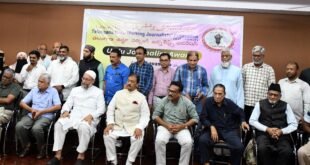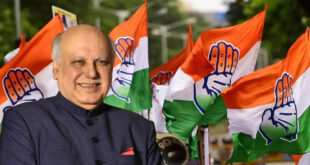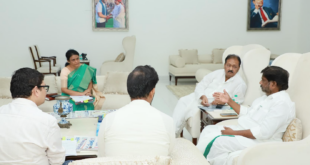By:Asad Mirza
Rahul Gandhi’s resignation as Congress President seems to have put the party on the brink of a collapse. Even after getting rejected by the people, who do not think that the party has changed much after Rahul Gandhi took over the party’s command in December 2017, and despite his many experimentations with ‘soft-Hindutva’ while at the same time holding on to the minority vote, the Congress seems to be continuing with its old ways.
All his antics got negated when Sonia Gandhi and her electoral strategy once again became the Congress party’s line from the beginning of the campaign for the Lok Sabha elections. No one in the Congress called for a Ram temple at Ayodhya, a touchstone issue for many voters, especially in the Hindi belt.
Rahul could have won from anywhere in Kerala, but his choice of a constituency where the Indian Union Muslim League was ubiquitous further reinforced the perception of Congress as a “Minorities Only”
Some of these causes for defeat are the recent optics, but in reality what has contributed to the fall of the Congress party is the ‘feudal’ mind-set of the party leaders. They still consider themselves as the rulers and the voters as their ‘praja’ or people to serve them.
There was a strong disconnect between the ordinary grass root level worker of the party, toiling for the party under the harsh sun, whereas the top leadership sat ensconced in air conditioned comfort in Lutyen’s Delhi.
It was a common complaint that senior party leaders do not give time to party workers to discuss party matters or constituency level politics and strategy. In the absence of this the party workers at town, district and state level seemed to be working on the basis of their continued commitment to the party, and without any support from the party patriarchs.
Perhaps one reason for this mind-set having crept into the minds of the Congress leaders could be the uninterrupted power and associated patronage, which they enjoyed continuously from 1947 onwards, albeit with a little interruption after 1977, 79, 89-90 and 96-97. And this might not have happened if these very same leaders who have listened to Gandhi, who had called for disbanding Congress party after the independence.
On the other hand BJP albeit RSS seems to be a complete contrast to the Congress’s journey after 1947.
Having been ostracised and banned from time to time since 1925, RSS and the band of its zealous followers seem to have worked quietly yet determinedly.
A recent message circulating on WhatsApp gives out a list of organisations affiliated to RSS.
Instead of condemning the list and these organisations, what needs to be valued is the amount of time, energy and passion, which was given by individuals subscribing to one doctrine, to the cause of that doctrine.
The results are there for everyone to see. We have Saraswati Shishu Mandir in virtually all districts of the country, DAV schools and colleges in most of the Indian towns, research organisations whose areas of interest range from history, to rewriting educational texts to economics and sciences, outfits representing farmers, workers, traders, bankers etc.
The above two examples contain an inherent message for the Indian Muslims.
First, the Muslim leadership, both political and religious should understand that you can not take people under your command, for granted, if you become detached with them and do not interact with them, then surely they’ll desert you and chalk out a new course for themselves along with a new leadership.
Secondly, if other religionists can do so, then why can’t the Muslims? What holds you from starting a educational society pan-India, why don’t you start a research organisation which delves deep into studying the root causes ailing the community and remedial measures to set them right, what stops you from starting a historical research project which sets the record straight and highlights your contribution in making this country such a great nation, what stops you from starting organisations committed to various social causes, sciences and humanities? What stops you from giving inputs to the government of the day on all facets of life whether they be economic, scientific, environmental or cultural.
It is indeed high time that Muslims of India start thinking along these lines and for this to be a success, the only factor apart from commitment is to give up your so-called differences, which are inherently un-Islamic and instead start thinking, planning and acting like one composite entity.
Asad Mirza is a Sr journalist based in New Delhi. In his career spanning more than 20 years, he was also associated with BBC Urdu Service and Khaleej Times of Dubai. He writes on Muslims, educational and international affairs issues. Email: asad.mirza.nd@gmail.com
 Gawah (The Witness) – Hyderabad India Fearless By Birth, Pristine by Choice – First National Urdu Weekly From South India – Latest News, Breaking News, Special Stories, Interviews, Islamic, World, India, National News
Gawah (The Witness) – Hyderabad India Fearless By Birth, Pristine by Choice – First National Urdu Weekly From South India – Latest News, Breaking News, Special Stories, Interviews, Islamic, World, India, National News





